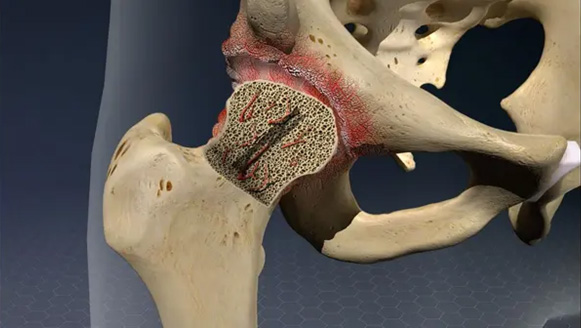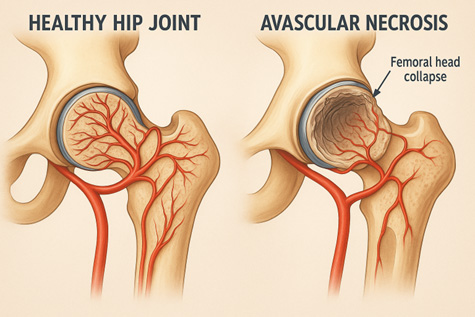If you've been diagnosed with Avascular Necrosis (AVN)-a condition where bone tissue dies due to a lack of blood supply-you may be wondering: Can I manage this without surgery? The good news is that in its early stages, AVN can often be managed with non-surgical treatments, especially when diagnosed before bone collapse.
In India, rising awareness and early diagnosis have shown a noticeable uptick in non-surgical AVN management success rates. AVN is particularly common among patients taking steroids, those with sickle cell disease, or individuals recovering from trauma.
Dr. Supreet Bajwa, a leading Hip & Knee Orthopaedic Surgeon based in Mumbai, advocates for conservative care first whenever possible. His goal is to help patients avoid or delay surgery through a mix of targeted therapies, imaging-based monitoring, and regenerative treatments.
Understanding your options can help you make informed decisions and potentially delay or even avoid surgical intervention like joint replacement.

What Is Avascular Necrosis (AVN)?
AVN, also known as osteonecrosis, is a condition where bone tissue dies due to interrupted blood supply. It commonly affects the hip, shoulder, and knee joints. Without proper treatment, AVN can progress to joint collapse.

Who Is at Risk of AVN?
- Patients on long-term steroid therapy
- Individuals with sickle cell disease or autoimmune disorders
- Alcoholics
- People with traumatic injuries (e.g., hip dislocations)
Early detection is key to successful non-surgical management.
What Are the Early Symptoms of AVN?
- Pain in the hip, knee, or shoulder
- Stiffness and reduced range of motion
- Pain that worsens with activity and improves with rest
If caught early (Stage I or II), you may be eligible for non-surgical interventions.
Can AVN Heal Without Surgery?
In some patients, especially when diagnosed early, AVN can stabilize or improve with conservative treatment. This includes lifestyle changes, medications, and targeted therapies.
Top Non-Surgical Treatments for AVN
Let’s explore effective non-operative approaches that can help slow or halt AVN progression:
1. Medications
- Bisphosphonates (like Alendronate) reduce bone breakdown
- Anti-inflammatories help manage pain
- Statins may improve blood flow and bone healing
These drugs may be prescribed for early-stage AVN and monitored over months.
2. Physical Therapy and Assistive Devices
- Strengthening exercises to reduce stress on affected joints
- Walking aids like crutches or canes to limit joint pressure
- Range-of-motion therapy to maintain flexibility
This approach is essential for slowing AVN and preserving joint function.
3. Lifestyle Modifications
- Avoid alcohol and smoking (both restrict blood flow)
- Reduce high-impact activities
- Manage chronic conditions like diabetes, lupus, or sickle cell
A healthier lifestyle can dramatically improve your outcome.
4. Electromagnetic Therapy (PEMF)
Pulsed Electromagnetic Field Therapy (PEMF) is a non-invasive treatment that stimulates bone repair and improves blood flow. It’s painless and often recommended for early AVN stages.
5. Hyperbaric Oxygen Therapy (HBOT)
In HBOT, patients breathe pure oxygen in a pressurized chamber, which increases oxygen supply to damaged tissues. It's particularly useful in AVN caused by trauma or sickle cell anemia.
6. Stem Cell and PRP Therapy
Biological treatments like:
- Bone marrow aspirate concentrate (BMAC)
- Platelet-rich plasma (PRP)
These therapies involve injecting concentrated growth factors into the necrotic area to stimulate healing.
7. Weight Management
Extra body weight puts additional stress on your joints, accelerating AVN. Weight loss helps relieve pressure and delay the need for surgery.
How Do I Know If These Treatments Are Working?
Follow-up MRIs or bone scans can help evaluate treatment effectiveness. Symptom improvement, better range of motion, and pain reduction are also good indicators.
When Should You Consider Surgery?
If you’ve tried conservative treatment and still have:
- Worsening pain
- Reduced mobility
- Imaging that shows bone collapse (Stage III or IV)
Then it’s time to discuss surgical options like joint replacement.
How Long Can You Delay Surgery With These Treatments?
With proper non-surgical care, many patients can delay surgery by months or even years. Some may even stabilize permanently at early stages.
Dr. Supreet Bajwa, a Fellowship-Trained Hip & Knee Orthopaedic Surgeon in Mumbai, is known for his conservative-first philosophy. His protocol for AVN includes:
- Advanced MRI-based staging
- Medication and physiotherapy planning
- Biological augmentation like PRP/BMAC
- Close follow-ups to monitor progress
He is also an expert in transitioning to surgery only when absolutely necessary using:
- Minimally Invasive Joint Replacement
- Robotic Joint replacement Surgery
Dr. Bajwa has trained at the Sunshine Coast Orthopaedic Group, Australia, and brings over 1300+ successful surgeries of experience.
He practices at:
- Wockhardt Hospital (Mumbai Central & Mira Road)
If you catch AVN early, especially in stages I or II, non-surgical treatments can offer real hope. From medications and PRP to lifestyle changes and targeted therapy, you can control symptoms and delay (or even avoid) surgery.
Stay proactive, seek expert advice, and monitor your progress. And if needed, trust specialists like Dr. Supreet Bajwa for a balanced and personalized care plan.

